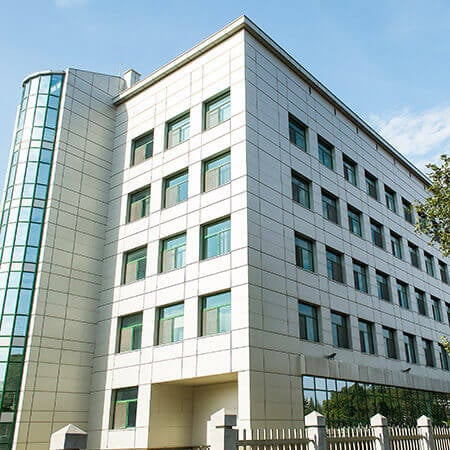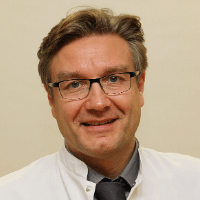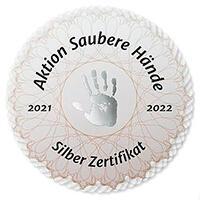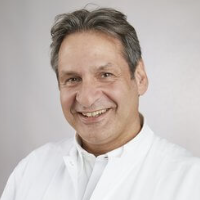Knee Arthritis III-IV Degree — Bilateral Total Knee Replacement and Rehabilitation: treatment in the Best Hospitals of Germany
Treatment prices are regulated by national law of the corresponding countries, but can also include additional hospital coefficients. In order to receive the individual cost calculation, please send us the request and medical records.
Joint Replacement in Germany
- Hip replacement
- Total knee replacement
- Shoulder joint replacement
- Total elbow replacement
- Hip replacement in neck fracture
- Total knee replacement and rehabilitation
- Hip replacement and rehabilitation
- Bilateral hip replacement
- Bilateral hip replacement and rehabilitation
- Bilateral total knee replacement
- Orthopedic rehabilitation

Department of Adult and Pediatric Orthopedics, Trauma Surgery, Foot Surgery, Hand Surgery and Rheumatology
The Department of Adult and Pediatric Orthopedics, Trauma Surgery, Foot Surgery, Hand Surgery and Rheumatology offers the full range of diagnostic and therapeutic services in its areas of specialization. The key areas of work of the department's doctors include large joint arthroplasty, arthroscopic interventions on the knee, hip, and shoulder joints, conservative and surgical treatment of foot and hand diseases and deformities, rheumatic joint lesions, orthopedic diseases in children, and musculoskeletal injuries. The key to successful clinical practice is the professionalism and unique experience of the department's medical team, combined with the advanced infrastructure and state-of-the-art equipment. The department has 5 operating rooms equipped with the latest technology. Most surgical interventions are performed using minimally invasive techniques, due to which, in the shortest possible time, the patient is verticalized, their mobility is restored, and a pronounced pain syndrome is excluded. The department annually performs more than 4,500 surgical interventions, including especially complex ones, so the specialists at the medical facility are rightfully proud of their impressive clinical experience in the surgical treatment of orthopedic diseases. Over the years, the department has gained an excellent reputation not only in Germany but also far beyond its borders.





Department of Adult and Pediatric Orthopedics, Trauma Surgery and Arthroplasty
The Department of Adult and Pediatric Orthopedics, Trauma Surgery and Arthroplasty provides the full range of medical services in the areas of its competence. The department's team of doctors treats patients with diseases and injuries of the musculoskeletal system, joints, bones, tendons, ligaments, and muscles. Orthopedists specialize in partial and total knee, hip, and shoulder replacement surgery, as well as successfully perform revision arthroplasty. Doctors perform arthroplasty at the EndoCert certified Maximum Care Center for Joint Replacement Surgery. The department also has the status of a regional Trauma Center Berlin-Brandenburg, where both common household injuries and severe multiple injuries are effectively treated. The department's team of doctors has a perfect command of advanced conservative and surgical treatment methods in the area of its specialization. Joint replacement surgery is performed here using minimally invasive techniques, which allows the patient to get back on their feet and get rid of pain as quickly as possible. The department has also gained vast experience in arthroscopic treatment of pathologies of large joints and injuries of the tendons, ligaments, and muscles. The department uses an innovative method of cartilage tissue restoration called autologous chondrocyte implantation. Patients of the medical facility receive personalized medical care in comfortable conditions.




Department of Trauma Surgery, Orthopedic Surgery and Foot Surgery
The Department of Trauma Surgery, Orthopedic Surgery and Foot Surgery offers the full range of modern diagnostic tests for the detection of musculoskeletal diseases, as well as many effective treatment methods for their elimination. Moreover, the department enjoys the status of the Center of Excellence for Trauma Surgery, so trauma surgeons working in the medical facility have a rich and unique experience in the treatment of patients after both simple common and especially complex injuries, including traumatic brain injuries, spinal injuries, polytrauma, injuries of the internal organs, etc. In addition to the treatment of injuries, a special focus is on arthroscopic interventions, joint replacement surgery, interventions to treat foot diseases and deformities, as well as surgery to resect soft tissue tumors. The surgical treatment is provided in the high-tech operating rooms with advanced surgical instruments and computerized systems for the most effective interventions with minimal damage to the healthy adjacent tissues.




Gonarthrosis is one of the most common orthopedic diseases. It constantly progresses, causing chronic pain, and impairs the function of the lower limb. Knee replacement surgery is performed for the treatment of advanced stages of the disease. An artificial endoprosthesis is implanted instead of the patient's own knee joint. Some patients require the replacement of two joints at once. Doctors in Germany perform such operations. Booking Health will help you find a hospital and organize your trip.
Content
- Who may need bilateral knee replacement?
- What are the types of bilateral knee replacement?
- Features of single-stage bilateral knee replacement
- Features of two-stage replacement surgery
- Early phase of rehabilitation
- Late phase of rehabilitation
- Features of rehabilitation after the single-stage bilateral replacement
- Functional outcomes of surgery
- Why is it worth undergoing treatment in Germany?
- Treatment in Germany with Booking Health
Who may need bilateral knee replacement?
The main indication for knee replacement is grade 3-4 arthritis. This is a degenerative dystrophic disease, which eventually leads to the complete destruction of the knee, its deformation and deviation of the axis of the lower limb.
The main causes of arthrosis are:
- Congenital structural features of the joint, which make it insufficiently resistant to load.
- Weak leg muscles.
- Obesity.
- Intense physical activity, including sports.
- Previous injuries.
- Sedentary life.
Most of the causes affect not one, but two knee joints at once. The exception is some sports, which put more load on one leg, as well as knee injuries.
Approximately 20% of patients with gonarthrosis have pathological changes in the second joint. In such cases, total knee replacement is required on both sides.
Cost of the bilateral total knee replacement surgery starts from €28,700. You can find prices for other treatment options and rehabilitation in knee arthritis on the Booking Health website.
The best hospitals in Germany for knee replacement and knee rehabilitation are:
- Vitos Orthopedic Clinic Kassel
- Hospital Kassel
- Academic Hospital DRK Berlin Westend
- St. Antonius Hospital Eschweiler
What are the types of bilateral knee replacement?
Total bilateral knee replacement can be either single-stage or two-stage. Each approach has its own advantages and disadvantages.
The single-stage surgery involves the replacement of two knee joints within a single operation. Such interventions help to reduce the general time and the cost of medical treatment, but they are more traumatic and are not recommended for patients over 85 years old with severe concomitant internal diseases.
The two-stage replacement involves performing two consecutive operations to replace one and then the second knee joint. The interval between them is usually from 3 to 6 months. It is sometimes shortened to reduce the total amount of time spent on rehabilitation. The advantage of this approach lies primarily in the lower health risk, but it takes much longer to achieve the full therapeutic effect, and the total cost of treatment increases.
Features of single-stage bilateral knee replacement
The single-stage approach to the replacement of two knee joints has the following benefits:
- The cost of treatment is reduced by about 30% – the patient still has to purchase two artificial joints, but one operation is cheaper than two, the costs of diagnostics and rehabilitation are reduced as well.
- A person spends less time in the hospital as compared to two surgical procedures (although after replacing two joints, the hospital stay is longer than after replacing one knee).
- Less time is spent on rehabilitation, since the patient has to undergo only one, but not two rehabilitation treatment sessions.
One of the most important benefits is better functional results. A few months after total single-stage replacement, the function of the lower limbs is fully restored and the pain disappears. The patient can return to work and have an active life.
The main disadvantage of single-stage replacement is the higher risk of early postoperative complications. This limits the possibility of using the operation in patients with concomitant internal pathologies. In addition, the early rehabilitation period is more complex due to the greater trauma rate of the intervention and significant blood loss.
Features of two-stage replacement surgery
When replacing one and then the second knee, the total treatment time increases. In total, patients spend more time in the hospital and rehabilitation center. They have to undergo two operations instead of one. The financial costs for knee replacement are also increased.
The main advantage of this approach is that there are fewer health risks. The two-stage knee replacement surgery is more often performed in elderly patients who are weakened by concomitant diseases.
Sometimes doctors use short intervals between two surgeries. Such an approach makes the treatment safer, and at the same time eliminates the main disadvantages of the two-stage replacement surgery. The second intervention on the other knee is performed 2-3 weeks after the first one. As a result, the rehabilitation period is significantly reduced. The time to achieve the final results of bilateral knee arthritis treatment decreases.
Early phase of rehabilitation
The early rehabilitation period after knee replacement surgery begins immediately after its completion and lasts for 2 weeks.
Bilateral total knee replacement is more traumatic than unilateral knee replacement. The patient stays under anesthesia longer, more tissue is damaged, and blood loss also increases. Therefore, the early rehabilitation period can be more complex and lasts longer. On average, a person after bilateral total knee replacement spends more time in the hospital.
However, early activation is very important for health. The patient is engaged in breathing exercises, exercises for the muscles of the whole body and lower limbs. The passive knee workout is also possible. The first workouts take place while lying in bed, but gradually a person learns to walk with support. After the replacement of two knees, robotic systems are often used to restore walking skills more quickly.
At the early phase of rehabilitation, it is very important to eliminate swelling, inflammation and pain in the knee. It is necessary to avoid stagnation and ensure normal tissue regeneration. For this purpose, doctors use massage, physiotherapy and therapeutic exercises. Physiotherapy procedures using portable devices can be performed right at the patient's bedside. In addition, the patient room includes all means to perform gymnastic exercises.
Drug therapy also helps. The patients in Germany receive high quality accompanying therapy. Antibiotics are used to reduce the risk of infections. Anticoagulants are given to prevent thromboembolic complications. For the same purpose, elastic bandaging of the lower limbs is indicated.
Late phase of rehabilitation
During the first 2-3 weeks, the patient stays in the hospital where he underwent surgery. Then he can go to the rehabilitation center.
German rehabilitation medicine is highly respected throughout the world. In terms of the quality of patient recovery, Germany is unequaled. The country offers more than 1,500 rehabilitation centers. Most of them deal with orthopedic rehabilitation. Hundreds of thousands of patients after major joint surgeries visit these centers every year.
The rehabilitation schemes in Germany are honed to perfection, but adjusted individually, taking into account the patient's health status, the function of the lower limbs and the current recovery results. The patient is examined every week. The specialists modify the training program to make the level of exercises high enough for continued progress, but at the same time not excessive, to avoid complications.
The basic methods of rehabilitation include:
- Therapeutic exercises: training in gyms and swimming pools.
- Training on special simulators, robotic systems.
- Physiotherapy procedures.
- Massage.
- Practicing walking skills, household and work skills.
The patients during their stay in the rehabilitation center receive symptomatic and accompanying therapy.
Features of rehabilitation after the single-stage bilateral replacement
After the single-stage bilateral replacement, the early phase of rehabilitation can be more complex for patients, but after 2-3 weeks it becomes much easier. In general, advanced rehabilitation is easier for those who underwent single-stage surgery as compared to the two-stage approach.
If the second leg is not operated on, then it hurts, as it is affected by arthritis. This means that a person cannot fully lean on it when walking. He spares this leg and uses the operated limb more often. As a result, it develops better: muscles are built up faster, tissue regeneration is stimulated, and joint mobility is developed.
With the two-stage approach, after the first surgery the patient is unable to exercise fully. This is due to the fact that his second leg hurts. The patient needs to constantly take painkillers, but they do not completely eliminate pain. As a result, the effectiveness of rehabilitation decreases.
After the single-stage procedure, the operated limbs also hurt, but pain quickly disappears: after 2-3 weeks the pain syndrome becomes minimal. At the same time, with the two-stage approach, the pain in the unoperated leg only increases. This is due to the fact that the load on it increases. Osteoarthritis of the second limb progresses rapidly, especially in the first three months after surgery.
If the doctor operates on only one leg, then the person cannot form the correct walking stereotype. This is impossible both because of the pain and because of the deformation of the second limb. If he undergoes the single-stage replacement of two joints at once, then he will immediately form a correct gait during the rehabilitation.
Functional outcomes of surgery
In Germany, knee surgery is successful in over 90% of cases. The doctors achieve good results even in the most complex cases, including the development of ankylosis (joint stiffness), bilateral arthritis, as well as after revision (repeated) knee surgery.
Most patients achieve complete restoration of limb function and pain relief. However, the final functional outcomes largely depend not only on the surgery, but also on the follow-up rehabilitation.
The functional outcomes are generally better for the single-stage bilateral knee replacement. The patients have a better range of motion in the knee joint. They need to use a cane less often, they more often return to work and have a more active lifestyle. The severity of pain in the long term after surgery is also lower. Most patients have no pain syndrome at all. In addition, after the single-stage bilateral replacement surgery, the pain subsides more quickly.
Why is it worth undergoing treatment in Germany?
Germany performs hundreds of thousands of large joint replacement surgeries every year. The doctors have vast experience in performing even the most complex interventions. Many patients undergo the single-stage replacement of two knee joints. German orthopedists know how to perform these operations correctly, how to supervise the patient in the early rehabilitation period, and how to fully restore the function of the lower limbs.
Here are several reasons why you should undergo treatment for bilateral gonarthrosis in Germany:
- Orthopedics in Germany is one of the most developed areas of medicine. Even patients from other developed countries come here for medical treatment.
- The hospitals have state-of-the-art equipment.
- The doctors implant modern types of endoprostheses that can serve for decades.
- Computer-assisted navigation is used to more accurately position the artificial knee joints.
- The risk of aseptic loosening of the endoprosthesis due to the use of computer-assisted navigation is reduced by 8 times.
- After the total knee replacement, most patients will not need revision interventions in the future.
- High-quality early rehabilitation and accompanying drug therapy help the doctors to minimize the risk of complications.
- High-quality recovery in the advanced rehabilitation period ensures complete restoration of limb function and pain relief.
- Affordable cost of treatment as compared to other developed countries.
Both treatment and rehabilitation in Germany allow the doctors to "put the patients on their legs", even those with the most severe clinical cases. Even if the knee joints are completely destroyed, a person cannot walk and suffer from unbearable pain, after 3-4 months he returns to an active life and forgets about arthritis forever.
Treatment in Germany with Booking Health
To undergo bilateral knee replacement in one of the best German hospitals, please use the services of Booking Health. On our website, you can see the cost of treatment in different German hospitals, compare prices and book a medical care program at an affordable price.
Please contact the Booking Health specialists to undergo treatment in Germany. Here are our benefits for you:
- We will choose the best hospitals for knee surgery in Germany.
- We will help you overcome the language barrier, establish communication with the German hospital and your attending physician.
- We will reduce the waiting time for the medical care program and book a doctor's appointment on the most suitable dates.
- We will reduce the price. The cost of treatment in Germany will be decreased due to the lack of additional coefficients for foreign patients.
- We will take care of all organizational issues: documents for entering the country, transfer from the airport, hotel, interpreter, etc.
- We will prepare a medical care program and translate medical documents into German. You do not have to repeat previously performed diagnostic tests.
- We will provide communication with the hospital after the completion of treatment in Germany.
- We will organize additional medical examination, treatment in Germany or rehabilitation, if necessary.
- We will buy medicines in Germany and forward them to your native country.
- We will help you keep in touch with the hospital after treatment in Germany.
Booking Health makes treatment in Germany easier, faster and cheaper. We will fully organize your trip, and you will only have to focus on restoring your health.
Authors: Dr. Vadim Zhiliuk, Dr. Sergey Pashchenko

